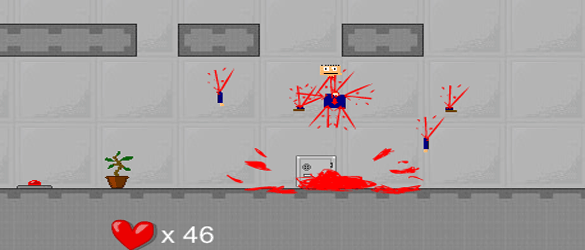The most provocative such moment occurs in Shin Megami Tensei: Persona 3. The teenage protagonists of Atlus' role-playing game use a device called an Evoker to summon spirits known as Personas to assist in battle. The Evoker looks distinctly like a handgun -- in the Japanese version of the game, it is a handgun -- and it is fired into the user's head.
This is a deliberate but difficult portrayal of self-destruction. For one, the Evoker is pointedly non-lethal. Blue energy, rather than blood, sprays outward. Yet the image of a gun pointed at temple or forehead is an unmistakable icon of suicide. According to Project Lead Yu Namba in an interview at RPGamer, "The act of pointing a gun-like device at yourself is considered violence" by the ESRB, even though the Evoker causes no death or injury.
Use of the Evoker is narratively drawn as a powerful and highly consequential act. Some characters are clearly terrified of using the Evoker. In the cut-scene that depicts the Protagonist's first use of his Evoker, your character struggles to pull the trigger on himself. Yet the Evoker isn't used just once or even a handful of times; it is intricately woven into gameplay. In a boss battle, characters might shoot themselves in the head upwards of a dozen or more times, summoning Personas over and over to deal damage to the enemy or use special abilities. The Evoker actually protects and preserves your life in the game -- but its repeated use as a gameplay mechanic cannot but feel masochistic. Heroes convulse violently after they pull the trigger.

Persona 3 reverses the direction of game violence, like a mirror put before gaming. Your simulated suicides are a summation of how all games work: Without death and rebirth, most games could not function.
"It seems to be so much a part of games that we can't think of making a game without it," says Jesse Venbrux, an independent developer, on the way that games have had us dying repeatedly ever since we pumped coins into arcade cabinets.
Many of Venbrux's games -- the Karoshi series, Deaths, Execution, and the just-released They Need to Be Fed -- read like commentaries on the plasticity of game life. The best-known, Karoshi: Suicide Salaryman, is a puzzle-platformer where you exit levels by finding a way to kill yourself. The avatar is a suited businessman, the levels are full of office furniture, and the word "karoshi" is a Japanese term that means "death from overwork." But these references are beside the point.
What matters in Karoshi is that many of its puzzles make you work to die. Its less-interesting puzzles have you jump onto a bed of spikes or electrified panels -- no differently than you would one of Mario's flagpoles. But others require you to ricochet a bullet into your face, position a metal safe to fall onto you when released, or design a cascade of explosions that will propel an object directly onto your head.
As Venbrux puts it, a Karoshi player might "do something that turns out was the opposite of what he had to do." We are used to dodging bullets, not chasing them. Unlike virtually every platformer, all roads in Karoshi ultimately point back to the self. Your exit in each level is your own body. The further you go in Karoshi, the more that body feels like a burden, and the more you wish to shed it.

The stigma of suicide is that it rejects the gift of life. Likewise, expendable lives in games may be morally ambiguous because they imply that life is expendable. But in Persona 3 and Karoshi, your extra lives are things to be grappled with, like real objects.
"If your actions have real consequences, that makes the experience more interesting. I would be interested to play a game where I know I only have one try," Venbrux says. "The problem is, it's technically impossible to make a game like that. If you really want to replay the game, you could just do it on another PC. There are a lot of ways to try again."
Even Venbrux's game Execution, which infamously presents an irreversible scenario, can ultimately be reset by deleting and reinstalling the game. Since games are a digital medium, the lives contained within are easily remade.
"I don't think there's a way, really. [Metal Gear Solid creator] Hideo Kojima once said he wanted to make a game where, if you died, the disc would burn itself. Maybe that's a good idea."
Playing and replaying a game means you keep dying. But if the point of dying is to start over, maybe there is a point to dying.


